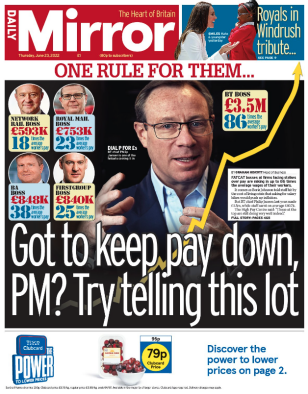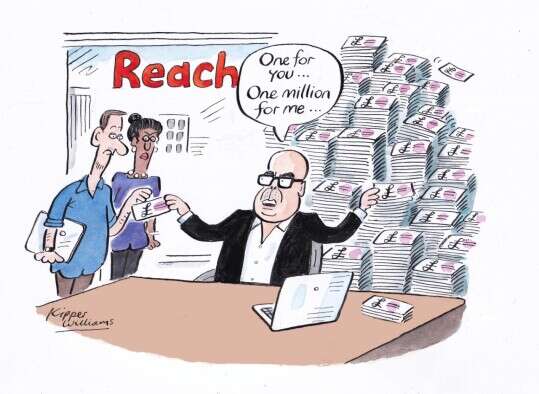
Reach journalists across the UK and Ireland are preparing to start a series of walkouts on Friday 26 August.
Here, National Union of Journalists general secretary Michelle Stanistreet (pictured) writes about what her members want, and why she believes helping them through the cost of living crisis with a pay rise larger than 3% would pay off in the long run and help boost the company’s credibility.
Reach’s chief executive Jim Mullen has a background in bookmaking, previously running high street betting chain Ladbrokes. You might expect that would have made him a canny calculator of chance. Yet he is currently backing such an improbable long shot that you have to wonder if he learned anything from his years on the turf.
His gamble is that no one will notice – or care about – the yawning gap between the editorial positions promoted in Reach’s newspapers, and his current stance that his own staff should take on the chin a 7% real-terms pay cut.
On the face of it Reach titles have a fine record of championing fair pay.
In an editorial in June, the Daily Mirror made clear whose side the paper is on, declaring: “Hard-pressed workers have been forced to threaten action as wages have failed to keep up with inflation and the rising cost of living.” During the summer another Reach title and newspaper of my childhood, the Liverpool Echo, reported on bus drivers struggling to make ends meet on their “average pay of £27,000 a year”. They were striking for a better offer than 5% now and a further 3.5% in October.
The Daily Star has told its readers that the police, council cleaning staff and teachers “deserve better pay”. Despite its growing love-in with Liz Truss, a Daily Express editorial has also said: “Society has grossly undervalued key workers who keep the country running”.
Nor can there be any doubt that Reach’s management consider their journalists to be key workers, working across newspapers that are part of the spectrum of essential public services. Every week at the height of the pandemic, I attended virtual meetings convened by the government that brought together the leaders of all the UK’s news platforms with government ministers and civil servants. Newspaper bosses from across the industry and the NUJ were at one, arguing that reporters, photographers and production journalists were critical to keeping the country going during those dark days and that the industry needed help to get through the unfolding crisis.
At that point, industry bosses were pleading for government advertising to keep them afloat. Today, despite a robust return to profitability Reach management refuses to countenance a pay rise for staff of more than 3% and has failed to engage in meaningful negotiations with the NUJ.
Of course, NUJ members at Reach are not asking for more money as a reward for keeping the company going during the pandemic. They simply seek to limit the pay cut that arises from surging inflation, on the back of years of stagnated pay. Journalists across the group – and their families – are struggling to make ends meet, with increasing cases of hardship being reported to the NUJ, whilst their employer trousers the profits.
Reach bosses can hardly claim to be unaware that prices are going up. Editorial coverage aside, the publisher’s titles have nearly all seen eye-popping cover-price increases in the past year; by 11% at the Daily Record, 22% at the Mirror, and a whopping 46% at the Express.
So what is Reach doing with its revenue?
The predictable truth is that the company is more than happy to reward those at the top. Jim Mullen, and chief financial officer Simon Fuller, both helped themselves to 700% pay increases last year, taking their remuneration to £4,089,000 and £3,391,000 respectively [editor’s note: this is largely made up of a long-term incentive plan that is dependent on the share price and cannot be unlocked until 2024]. And the shareholders have benefited too – £14m paid in a half-yearly dividend, a sum equivalent to a 7% pay rise for staff.

Daily Mirror ‘fat cat’ front page on 23 June 2022
These staggering salaries open another yawning credibility gap for Mullen. In June the Daily Mirror ran a dramatic splash attacking “fat-cat bosses” for “raking in” salaries amounting to many multiples of that paid to their average workers. The chief executives of Network Rail, Royal Mail, BA, First Group, and BT all had the indignity of their faces and their remuneration plastered over the tabloid’s front page.
The most egregious, the Daily Mirror suggested, was BT’s Phillip Jensen who is paid 86 times that of his average employee. But a starker example of executive excess lay much closer to home. In the CEO fat-cattery stakes, Jensen must look on in envy at his Reach counterpart, with Lucky Jim earning 104 times the Reach median pay [again, that pay largely includes share options which have yet to be cashed in].
Perhaps Jim Mullen imagines that the cognitive dissonance that exists between what his papers say and what the company does to their staff won’t register with readers? Sadly that is another dangerous wager.

Cartoon about Reach chief executive Jim Mullen, shared by the NUJ. Cartoon by Kipper Williams
Integrity matters more to news platforms today than ever. Competition comes from a blizzard of amateur opinion, fake news and infotainment. Credibility is what distinguishes the established media from many of the upstarts.
That trust is hard won and easily lost. By preaching one set of values while applying the opposite, Reach management is staking its most valuable asset on a sure-fire loser.
Let’s be clear – no-one wants this strike. Workers only ever contemplate industrial action as a last resort. Reach employs hundreds of enormously talented journalists – they are motivated by serving their communities and keeping the public informed, not by a desire to picket their employer.
In its July editorial, next to a spread headlined “Give Us Fair Wage”, the Daily Mirror called for meaningful engagement with the unions: “The Conservatives are itching for a showdown with the unions to distract attention from their mishandling of the economy. They should be trying to negotiate a settlement rather than inflaming the situation.”
Wise words. Instead of threatening staff with lost share scheme bonuses and whipping up fear with talk of job losses, Reach should be trying to resolve this dispute and come up with a solution that addresses the financial pressures its journalists and their families are facing. Instead of adopting a ‘we will not negotiate with terrorists’ stance with its own people, the company should be engaging in the collective bargaining process and talking until we find a compromise solution. The NUJ has made it clear we are willing to get round the table and sort things out constructively.
My tip for Jim Mullen is a simple one – bet on your staff. The journalists across the group, working on titles up and down the UK and Ireland, should be just as valued a stakeholder as shareholders and senior executives. They have already delivered remarkable results for the company and will continue to do their jobs with skill and passion. Equip them to get through this cost-of-living crisis in a way that shows how you value and respect them. Down that route lies not only a return to integrity, but also a winner that will pay out again and again.
Picture: NUJ
Email pged@pressgazette.co.uk to point out mistakes, provide story tips or send in a letter for publication on our "Letters Page" blog
